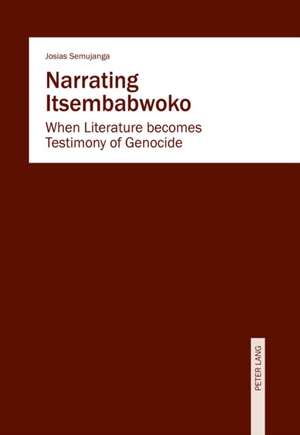Narrating Itsembabwoko
Autor Josias Semujangaen Limba Engleză Hardback – 25 sep 2016
Preț: 545.66 lei
Preț vechi: 708.66 lei
-23% Nou
Puncte Express: 818
Preț estimativ în valută:
104.41€ • 109.29$ • 86.90£
104.41€ • 109.29$ • 86.90£
Carte tipărită la comandă
Livrare economică 31 martie-14 aprilie
Preluare comenzi: 021 569.72.76
Specificații
ISBN-13: 9783034320573
ISBN-10: 3034320574
Pagini: 248
Dimensiuni: 161 x 231 x 20 mm
Greutate: 0.43 kg
Ediția:Nouă
Editura: Peter Lang Copyright AG
ISBN-10: 3034320574
Pagini: 248
Dimensiuni: 161 x 231 x 20 mm
Greutate: 0.43 kg
Ediția:Nouă
Editura: Peter Lang Copyright AG
Notă biografică
Josias Semujanga is Professor of African literature and literary theory at the University of Montreal. His research interests are the analysis of social discourse, the narratives of the Genocide, the African novel and anthropological narratives. He has published numerous books and scholarly articles including Les récits fondateurs du drame rwandais, The Origins of the Rwandan Genocide, Le génocide, sujet de fiction ? and Dynamique des genres dans le romain africain.
Cuprins
Introduction: Narratives of Genocide, Emotion, and Reader - The Narratives Seed of the Genocide - The Oldest Orphan: The Child's Voice Telling the Unthinkable - Harvest of Skulls: Recycling the Fragments of the Holocaust - Murambi, The Book of Bones: Polyphonic Voices and Testimony - The Shadow of Imana: Travelling over the Maze of Genocide - Murekatete: The Broken Brotherhood and the Inability to Love - The Hill Moth: Eros and Thanatos - Fire under the Cassock: The Question of Collective Guilt - Inyenzi or the Cockroaches: Trans-generational Memory - Shake Hands with the Devil: Humanitarian Rhetoric and Genocide Testimony - Conclusion
Descriere
In this study, the mecanisms by which literature, fiction, and other narratives could become testimonial of genocide are analyzed. It is demonstrated that fictional works and testimony narratives, by creating shared emotion between reader and writer, create the Human truth, which is more important than the scienfic truth.
